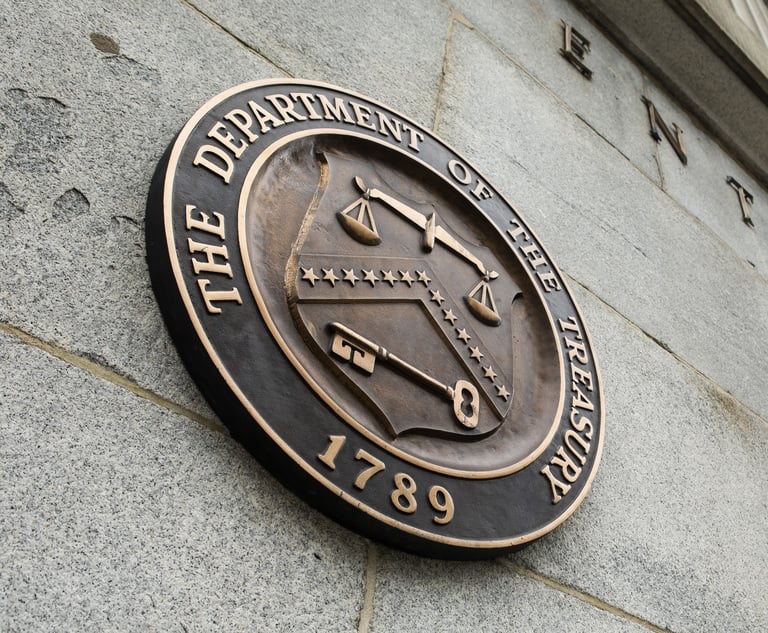US Supreme Court Could Add Protection for Florida LGBTQ Employees
Currently, South Florida employees in Broward, Palm Beach, Miami-Dade and Monroe counties have neither a federal cause of action based upon Title VII nor a cause of action based on the Florida Civil Rights Act (FCRA).
April 29, 2019 at 10:30 AM
4 minute read
 Aaron Tandy of Pathman Lewis.
Aaron Tandy of Pathman Lewis.On April 22, the U.S. Supreme Court agreed to place three employment cases on its docket for the October term—Bostock v. Clayton County, Georgia, Altitude Express v. Zarda and R.G. & G.R. Harris Funeral Homes v. Equal Opportunity Employment Commission. Each of the cases asks the court to interpret that language of Title VII of the Civil Rights Act of 1964 (Title VII) that prohibits discrimination on the basis of “sex” broadly to embrace claims based on sexual orientation or gender identity discrimination. All of the parties watching the trio of cases closely hope the court will provide clear guidance on the interpretation of Title VII as federal courts currently are split as to whether federal law provides employees protection from discrimination based upon their sexual orientation or gender identity.
Currently, South Florida employees in Broward, Palm Beach, Miami-Dade and Monroe counties have neither a federal cause of action based upon Title VII nor a cause of action based on the Florida Civil Rights Act (FCRA). Only a patchwork of county and local ordinances (see, e.g., Miami Dade Code of Ordinances, Section 11A-26) make it unlawful in those jurisdictions for employers to consider sexual orientation when engaging with their employees with regard to job duties and employment decisions.
For now, Florida has no statewide statute specifically prohibiting bias in hiring, promotion, job assignment, termination or compensation on the basis of one's sexual orientation. Unlike some state laws that specifically prohibit discrimination on the basis of “sexual orientation,” the FCRA does not include such specific language and has not been interpreted to cover such situations.
Instead, the FCRA only prohibits discrimination by employers on the basis of the “sex” of their employees, i.e., the employee's gender as “male” or “female” or “marriage”, i.e., meaning whether a party is married or not, not the gender of their spouse.
During this past legislative session, state Sen. Joe Gruter introduced the Florida Inclusive Workforce Act, SB 438, which would have amended the FCRA to prohibit discrimination in employment on the basis of gender identity and sexual orientation. Gruter's efforts were supported by several large Florida employers who currently privately offer protections to their LGBTQ employees. Unfortunately, based upon current proposed committee discussions, it appears that the 2019 Florida Legislative Session will end without action on the bill. A more comprehensive bill seeking to offer protections in housing and other areas has stalled in the legislature during past sessions.
Until the Supreme Court rules, the U.S. District Court for the Eleventh Circuit, Florida federal district and Florida state courts likely will continue to draw a line between employee discrimination and retaliation claims on the basis of sexual orientation (which are not covered under Title VII or the FCRA) and claims on the basis of gender nonconformity (which are covered). Other circuits have taken a different approach, finding that sexual orientation discrimination is prohibited by the language of Title VII as interpreted in light of changing societal norms despite Congress not amending the statute explicitly. To date, the Eleventh Circuit has specifically declined to join those jurisdictions. Despite this, the U.S. Equal Employment Opportunity Commission continues to pursue sexual orientation discrimination cases on behalf of Florida employees even if those claims are not recognized by the court.
While claims regarding sexual orientation and gender nonconformity harassment often overlap, only claims alleging that an employee suffered discrimination as a result of failing to adhere to prevailing cultural and societal expectations about what is “appropriate” to their gender create viable causes of action in Florida under Title VII and the FCRA. Further, courts have required that employees alleging gender nonconformity claims allege more than just mistreatment as a result of their gender or gender attraction. Florida courts have routinely dismissed complaints or granted summary judgment against employees whose claims in reality are based upon allegations that co-workers harassed them because of their sexual orientation.
For now, most protections come because of the voluntary, private actions of Florida employers. On the other hand, Florida courts have also upheld employer's actions in disciplining or terminating employees found to have harassed their co-workers about their sexual orientation or gender identification in violation of company policies.
Aaron Tandy heads Pathman Lewis' employment law practice, helping employers and employees navigate complex employment issues. He can be reached at [email protected].
This content has been archived. It is available through our partners, LexisNexis® and Bloomberg Law.
To view this content, please continue to their sites.
Not a Lexis Subscriber?
Subscribe Now
Not a Bloomberg Law Subscriber?
Subscribe Now
NOT FOR REPRINT
© 2025 ALM Global, LLC, All Rights Reserved. Request academic re-use from www.copyright.com. All other uses, submit a request to [email protected]. For more information visit Asset & Logo Licensing.
You Might Like
View All

Don’t Forget the Owner’s Manual: A Guide to Proving Liability Through Manufacturers’ Warnings and Instructions
5 minute read

Trending Stories
- 15th Circuit Considers Challenge to Louisiana's Ten Commandments Law
- 2Crocs Accused of Padding Revenue With Channel-Stuffing HEYDUDE Shoes
- 3E-discovery Practitioners Are Racing to Adapt to Social Media’s Evolving Landscape
- 4The Law Firm Disrupted: For Office Policies, Big Law Has Its Ear to the Market, Not to Trump
- 5FTC Finalizes Child Online Privacy Rule Updates, But Ferguson Eyes Further Changes
Who Got The Work
J. Brugh Lower of Gibbons has entered an appearance for industrial equipment supplier Devco Corporation in a pending trademark infringement lawsuit. The suit, accusing the defendant of selling knock-off Graco products, was filed Dec. 18 in New Jersey District Court by Rivkin Radler on behalf of Graco Inc. and Graco Minnesota. The case, assigned to U.S. District Judge Zahid N. Quraishi, is 3:24-cv-11294, Graco Inc. et al v. Devco Corporation.
Who Got The Work
Rebecca Maller-Stein and Kent A. Yalowitz of Arnold & Porter Kaye Scholer have entered their appearances for Hanaco Venture Capital and its executives, Lior Prosor and David Frankel, in a pending securities lawsuit. The action, filed on Dec. 24 in New York Southern District Court by Zell, Aron & Co. on behalf of Goldeneye Advisors, accuses the defendants of negligently and fraudulently managing the plaintiff's $1 million investment. The case, assigned to U.S. District Judge Vernon S. Broderick, is 1:24-cv-09918, Goldeneye Advisors, LLC v. Hanaco Venture Capital, Ltd. et al.
Who Got The Work
Attorneys from A&O Shearman has stepped in as defense counsel for Toronto-Dominion Bank and other defendants in a pending securities class action. The suit, filed Dec. 11 in New York Southern District Court by Bleichmar Fonti & Auld, accuses the defendants of concealing the bank's 'pervasive' deficiencies in regards to its compliance with the Bank Secrecy Act and the quality of its anti-money laundering controls. The case, assigned to U.S. District Judge Arun Subramanian, is 1:24-cv-09445, Gonzalez v. The Toronto-Dominion Bank et al.
Who Got The Work
Crown Castle International, a Pennsylvania company providing shared communications infrastructure, has turned to Luke D. Wolf of Gordon Rees Scully Mansukhani to fend off a pending breach-of-contract lawsuit. The court action, filed Nov. 25 in Michigan Eastern District Court by Hooper Hathaway PC on behalf of The Town Residences LLC, accuses Crown Castle of failing to transfer approximately $30,000 in utility payments from T-Mobile in breach of a roof-top lease and assignment agreement. The case, assigned to U.S. District Judge Susan K. Declercq, is 2:24-cv-13131, The Town Residences LLC v. T-Mobile US, Inc. et al.
Who Got The Work
Wilfred P. Coronato and Daniel M. Schwartz of McCarter & English have stepped in as defense counsel to Electrolux Home Products Inc. in a pending product liability lawsuit. The court action, filed Nov. 26 in New York Eastern District Court by Poulos Lopiccolo PC and Nagel Rice LLP on behalf of David Stern, alleges that the defendant's refrigerators’ drawers and shelving repeatedly break and fall apart within months after purchase. The case, assigned to U.S. District Judge Joan M. Azrack, is 2:24-cv-08204, Stern v. Electrolux Home Products, Inc.
Featured Firms
Law Offices of Gary Martin Hays & Associates, P.C.
(470) 294-1674
Law Offices of Mark E. Salomone
(857) 444-6468
Smith & Hassler
(713) 739-1250






